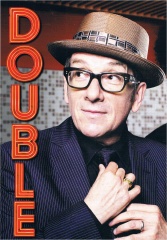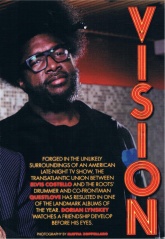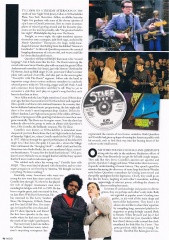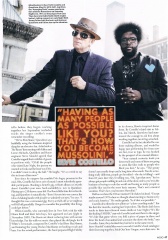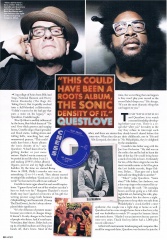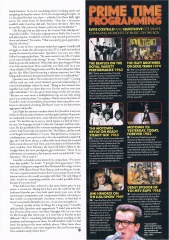Mojo, September 2013: Difference between revisions
(formatting, linkage) |
(+text part 1) |
||
| Line 10: | Line 10: | ||
---- | ---- | ||
{{Bibliography text}} | {{Bibliography text}} | ||
It's 5.30PM on a Tuesday afternoon in the studio of ''Late Night With Jimmy Fallon'' at 30 Rockefeller Plaza, New York. Showtime. Fallon, an affable ''Saturday Night Live'' graduate with none of the thorny egotism of a Jay Leno or David Letterman, likes to create an atmosphere of relaxed goofing around and his favourite playmates are the men he proudly calls "the greatest band in late night": Philadelphia hip hop crew [[The Roots]]. | |||
Tonight, as every night, the eight members squeeze themselves onto a compact, split-level stage, anchored by Ahmir "Questlove" Thompson, the huge, teddy-bear-shaped drummer that ''Rolling Stone'' has dubbed "America's bandleader." In this role Questlove possesses the comical hangdog demeanour of a sitcom dad, and wears a suit like he's been blackmailed into it. | |||
Questlove will later tell ''Mojo'' that music is his "second language," but it feels more like his first. The Roots warm up the crowd with some Stevie Wonder, play walk-on music for guests Gillian Anderson and comedian Aziz Ansari, jam with Maroon 5 keyboardist PJ Morton, back up R&B singer J Cole, punctuate Fallon's cornier jokes with sardonic drum fills, and take part in the semi-regular "Freestyln' with The Roots" segment. Fallon asks the band to improvise songs about various audience members in randomly selected genres: today it's '50s swing, reggae and Daft Punk. A nod and a murmur from Questlove and they're off. They've yet to encounter a style they can't play or a guest's song that they can't learn in less than an hour. | |||
Since Fallon took the ''Late Night'' reins from Conan O'Brien four years ago, the show has transformed The Roots from well-regarded if low-profile workhorses into national treasures. In a country that has no dedicated national music programming, the late-night talk Show is live music's most important shop window. Driven by Fallon's fandom, ''Late Night'' attracts guests of the calibre of Prince and Bruce Springsteen while spurring rival shows to raise their own game musically. The Roots are its engine room. Now the show has indirectly allowed the group to make an album with Questlove's hero, Elvis Costello, the brilliantly ominous ''Wise Up Ghost''. | |||
Costello's own history at 30 Rockefeller is somewhat more chequered. Just two floors above the ''Late Night'' studio is the home of ''Saturday Night Live'', where Costello made his live US TV debut in 1977. Midway through the agreed performance of his debut US single "Less Than Zero," the spiky 23-year-old — whom the ''Village Voice'' nicknamed the "Avenging Dork" — called a halt and led the Attractions into "Radio Radio," his as-vet-unreleased dig at censorious broadcasters: ''"I wanna bite the hand that feeds me."'' ''SNL'' producer Lorne Michaels was so enraged that he told this limey upstart that he'd never work in television again. | |||
"We rubbed each other the wrong way," Costello later tells ''Mojo''. "They were kind of pleased with themselves and we were super-arrogant on our first trip to America. We thought we knew everything. We knew nothing." | |||
Ironically, many Americans who were too young for new wave have since come to know Costello best through TV, where he has played the role of dapper renaissance man since mending his bridges with ''SNL'' in 1999. He has been a regular guest, and even stand-in host, on ''Late Show With David Letterman''. He has cameoed in ''The Larry Sanders Show'', ''The Simpsons'', ''30 Rock'', ''Treme'' and ''Two And A Half Men''. Five years ago, he launched his own chat-and-jam TV show, ''Spectacle'', and filmed the first four episodes in the very studio where he had once incurred the wrath of late-night's gatekeepers. | |||
That tasty irony is just one indicator of how American music television's surprising resurgence has regenerated the careers of two former outsiders. Both Questlove and Costello had given up hope of wooing the American public with hit records, only to find their way into the beating heart of the culture via the small screen. | |||
Only when you see Costello and Questlove sitting side-by-side in the midtown Manhattan offices of Blue Note Records do you get the full odd-couple impact. They talk like they dress: Costello's answers are sportive and precise. Questlove's shaggy and loose. What unites them is an encyclopaedic understanding of music history. They spend a good five minutes discussing the discovery of some long-lost Stevie Wonder reels before Questlove remembers he's being interviewed and sheepishly apologises for the digression. Clearly they could go on like this for hours, laughing at each other's anecdotes, nodding approvingly at relevant points, relishing the chance to discuss nothing but music. | |||
In terms of vast knowledge and passion in diverse genres, they are perhaps each other's only rivals. Both are regarded as popular music's leading tour guides, ''au fait'' with all the main drags and most of the backstreets. They know a lot about a lot and like to share their expertise by compiling long, annotated plavlists for magazines or giving lovingly curated iPods to friends. When Beyonce and Jay-Z had their first child last year, Questlove filled four (four!) devices with a round-the-clock soundtrack for little Blue Ivy Carter. "You gotta get them while they're young," he reasons. The iPod The Roots gave to Cos- | |||
{{cx}} | {{cx}} | ||
''Remainder of text to come... | |||
{{Bibliography notes header}} | {{Bibliography notes header}} | ||
Revision as of 23:02, 28 August 2013
|
